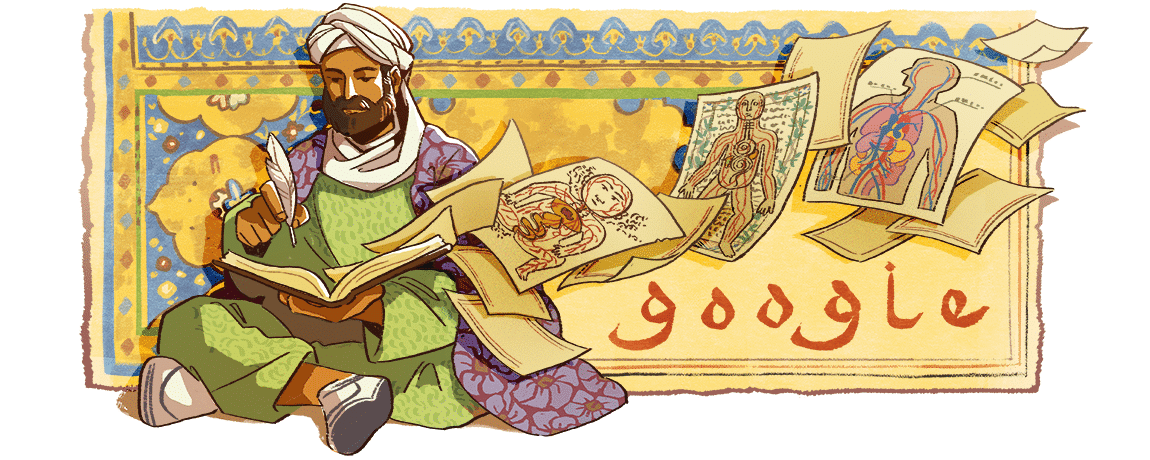Ibn Sina: The Philosopher-Physician of the Islamic Golden Age

Image Courtesy: Google Doodle
Avicenna, also known as Ibn Sina (7 August 980 – June 1037 CE). Flourishing during the Islamic Golden Age, he was in the employ of the Samanid Empire. Avicenna’s remarkable contributions to philosophy and medicine earned him the title of the father of early modern medicine. His influence extended to various fields, including astronomy, alchemy, geography, geology, psychology, Islamic theology, logic, mathematics, physics, and even poetry.
Early Life and Education: A Foundation for Greatness
Avicenna was born around 980 in the village of Afshana, located in Transoxiana, to a family of Persian heritage. His father, Abd Allah, served as an official in the Samanid bureaucracy and had previously been the governor of a village near Bukhara during the reign of Nuh II (r. 976–997). His mother’s hometown was Bukhara, which became a center of learning and a magnet for scholars.
Growing up in Bukhara, Avicenna was exposed to a vibrant intellectual atmosphere that fostered his early education. It is believed that his father took an active role in administering his education during his formative years. Despite his family’s conversion to Ismailism, Avicenna himself followed the Sunni Hanafi school, which was also the prevailing faith of the Samanids.
The Book of Healing: A Philosophical and Scientific Encyclopedia
One of Avicenna’s most renowned works is “The Book of Healing,” an extensive philosophical and scientific encyclopedia. In this monumental work, he explored a wide array of topics, offering profound insights and perspectives. His contributions to philosophy were heavily influenced by the Muslim Peripatetic school, which derived from Aristotelianism. This philosophical masterpiece became a cornerstone of intellectual discourse during his time and continues to inspire thinkers to this day.
The Canon of Medicine
Avicenna’s second magnum opus, “The Canon of Medicine,” is a medical encyclopedia that left an indelible mark on the field of medicine. This comprehensive work became a standard medical text at numerous medieval universities and remained in use as late as 1650, a testament to its enduring value. “The Canon of Medicine” revolutionized medical practices and shaped the development of healthcare for generations to come.
Ibn Sina: Works
Avicenna’s voluminous output of writings continues to awe and inspire. His treatises had a profound influence on subsequent Muslim thinkers in various disciplines, including theology, philology, mathematics, astronomy, physics, and music. Of the nearly 450 works attributed to him, around 240 have survived through the ages, and they cover an astonishing range of subjects. His philosophical treatises alone account for 150 volumes, while 40 focus on medical topics.
A Multifaceted Legacy
Avicenna’s intellectual prowess was not limited to philosophy and medicine. His vast corpus of writings encompassed a wide spectrum of subjects, reflecting his insatiable curiosity and thirst for knowledge. Among the subjects he delved into were astronomy, alchemy, geography, geology, psychology, Islamic theology, logic, mathematics, physics, and even poetry. Such a diverse range of interests demonstrated his versatility and contributed to his lasting impact on various disciplines.
A Multilingual Scholar
Avicenna’s intellectual pursuits were not bound by language barriers. While he primarily wrote most of his philosophical and scientific works in Arabic, he also made significant contributions in Persian, his native tongue. His ability to articulate complex ideas in both languages allowed his works to reach a broader audience and influence a more extensive sphere of scholars and thinkers.
Avicenna’s intellectual brilliance and contributions have left an indelible mark on human history. His deep insights into philosophy and medicine, along with his explorations of various other disciplines, have enriched our understanding of the world. As the father of early modern medicine, Avicenna’s legacy continues to inspire and guide the pursuit of knowledge, reminding us of the transformative power of human intellect and the enduring impact of a curious and inquisitive mind.
On 7 August 2018, a Google Doodle was created to celebrate Ibn Sina’s 1038th Birthday
Observer Voice is the one stop site for National, International news, Sports, Editor’s Choice, Art/culture contents, Quotes and much more. We also cover historical contents. Historical contents includes World History, Indian History, and what happened today. The website also covers Entertainment across the India and World.

